After launching our first non-English news bureau in Indonesia in 2012, Mongabay launched a second in Latin America in 2016. Mongabay Latam aimed to fill a crucial environmental information gap in the region via the consistent production of original, fact-based news on conservation and environmental issues across Latin America in Spanish.
As an international media outlet that is quickly becoming one of the top online sources of environmental news for the region, Mongabay Latam and its rise has a huge influence around Latin America, especially in informing decision-makers and conservation efforts in the region. Mongabay Latam’s presence has also inspired more mainstream media outlets to begin covering environmental issues more regularly.
In its 5 years of existence, Mongabay Latam has published more than 3,000 articles, established 45+ partnerships with other media outlets that republish its content, and created a network of over 40 environmental journalists throughout the region who regularly contribute stories published to the site.
In this relatively short time period, Mongabay Latam has managed to increase its readership to more than nine million readers per year.
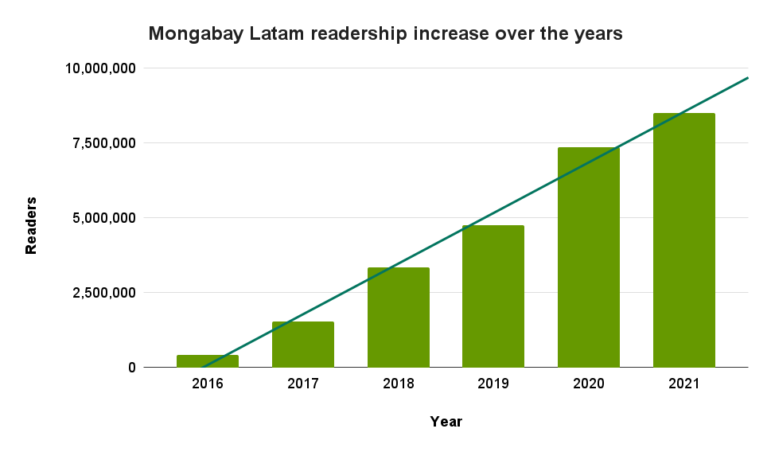
An impactful track record
Most importantly, we’re proud to witness the real-world impact of Mongabay Latam’s independent, nonprofit journalism, which reports on issues that are often overlooked by mainstream media. Mongabay Latam offers a unique service with a dedication and specialized focus on environmental issues ranging from deforestation to the rights of Indigenous peoples and local communities (IPLCs) to wildlife conservation.
Mongabay Latam’s work has led to multiple law enforcement actions and investigations. Furthermore, governments have invited the team to share their findings and have ordered protections for threatened environmental defenders based on its reporting, and various civil society groups and Indigenous communities have used Latam articles to support lawsuits.
The following examples demonstrate how Mongabay Latam’s cutting-edge reporting has had tangible impacts:
During the inaugural year in 2016, representatives of environment ministries in Colombia, Ecuador, Venezuela and Peru began to read Mongabay Latam articles. Several NGOs also reported using the site, including WCS-Peru, Amazon Watch and the Environmental Investigation Agency.
Mongabay Latam’s reporting also won critical acclaim. Within its first year, the team was selected twice among 122 nominees for Peru’s National Journalism Award.
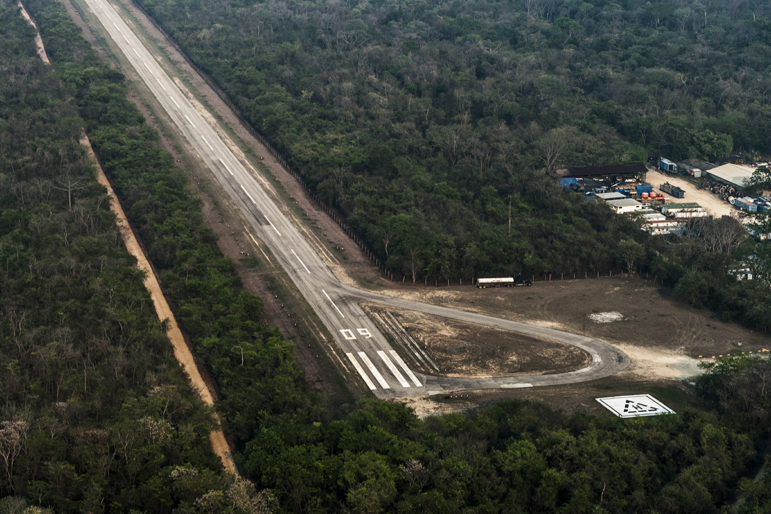
The Perenco company’s landing strip. Photo courtesy of Manuel Morillo.
In 2017, in collaboration with Plaza Pública in Guatemala, Latam broke a story about a clandestine airstrip in Laguna del Tigre National Park. After reading the article, a local prosecutor made an emergency visit to the hidden landing site, and Guatemala’s drug trafficking public prosecutor ordered its immediate destruction.
This report was part of the special investigation Ganadería y narcodeforestación en Centroamérica (Ranching and narco-deforestation in Central America), which was recognized by the Inter American Press Association awards.
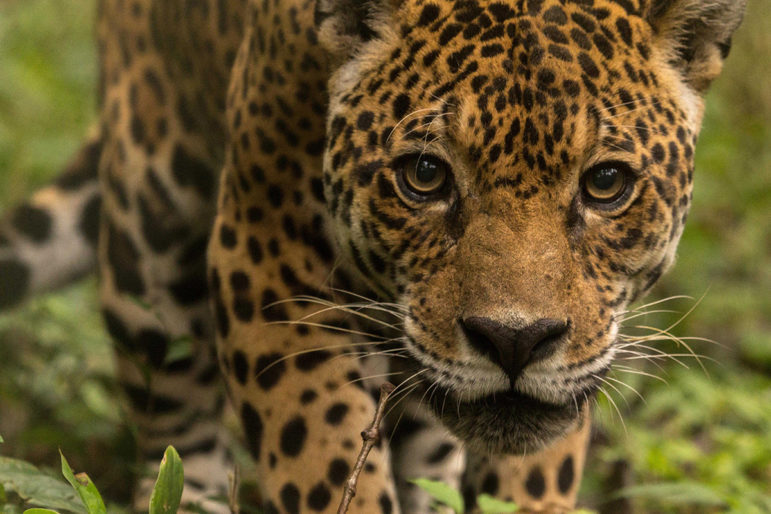
Jaguar at Ambue Ari Sanctuary of Comunidad Inti Wara Yassi. Image courtesy of CIWY.
In 2018, Latam’s investigative reporting was yet again recognized by the Inter-American Press Association with an Honorable Mention for its Excellence in Journalism Award, and was a finalist for the One World Media Award.
In Peru, this recognition also grew among policymakers, including Julio César Guzmán, the country’s special environmental crimes prosecutor. With respect to the value of Mongabay Latam’s investigative reporting, he said, “[W]ith the information they provide, which is evaluated and verified, people in government can make decisions.”
After a joint investigation by Mongabay Latam and Bolivia’s El Deber newspaper uncovered an international trafficking network in jaguar fangs, a Bolivian senator requested a report from the county’s Environment Ministry. In addition, Bolivian journalist Roberto Navia received the Premio Especial Iberoamericano de Periodismo Ambiental y Sostenible from the Premio Rey de España awards for the report.
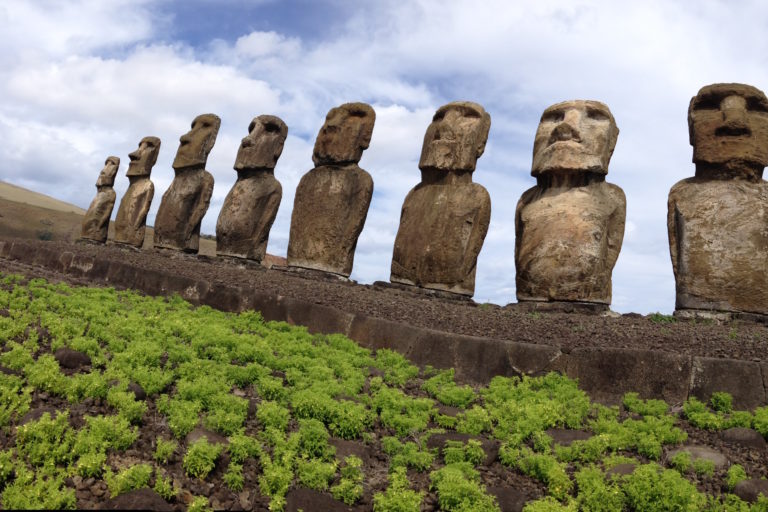
Rapa Nui National Park, created in 1966, was declared a World Heritage Site by UNESCO in December 1995. Image by Claudio Lobos.
In 2019, Mongabay Latam enhanced its regional alliances in Bolivia and Chile, building partnerships with Bio Bio, El Desconcierto, El Mercurio de Antofagasta and Página Siete, which began republishing its articles at their sites.
What’s more, Latam strengthened relations with El Deber via collaboration on cross-border special projects like Tierra de resistentes, a series that told the stories of environmental defenders under threat across Latin America. The project was coordinated by Consejo de Redacción of Colombia, which brought together 23 media outlets from the region. The work received an Honorable Mention for Journalistic Excellence 2020 by the Inter American Press Association awards.
Reporting by the team in 2019 exposed corruption among Chile’s Rapa Nui National Park managers, prompting the park’s board to dismiss the president following widespread coverage by media outlets that picked up on the controversy (as explained here in one of our recent case studies).
Another report about illegal mining in the Peruvian Amazon was used by the Special Prosecutor’s Office for Environmental Matters of Loreto-Maynas to initiate a preliminary investigation. The Office then asked Latam’s reporter to provide further information on the findings.
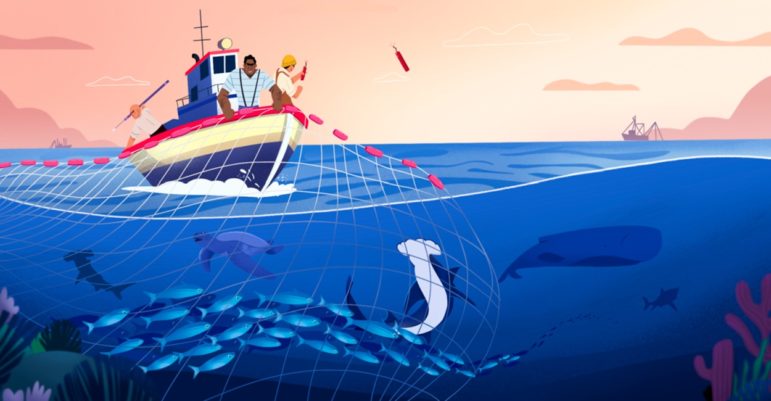
Image courtesy of Kipu Visual.
In 2020, a year marred by the onset of the COVID-19 pandemic, Mongabay Latam’s reporting inspired several impacts. For example, an investigation of an invasion of Amahuaca Indigenous lands by illegal gold miners in Peru prompted authorities to conduct two interventions in the area to evict miners and prevent further illegal activity. Multiple government officials contacted Mongabay for more information.
In addition, a report on illegal fishing in marine protected areas was recognized by the Global Investigative Journalism Network in their list of the 10 most important investigative reports in Latin America of 2020.
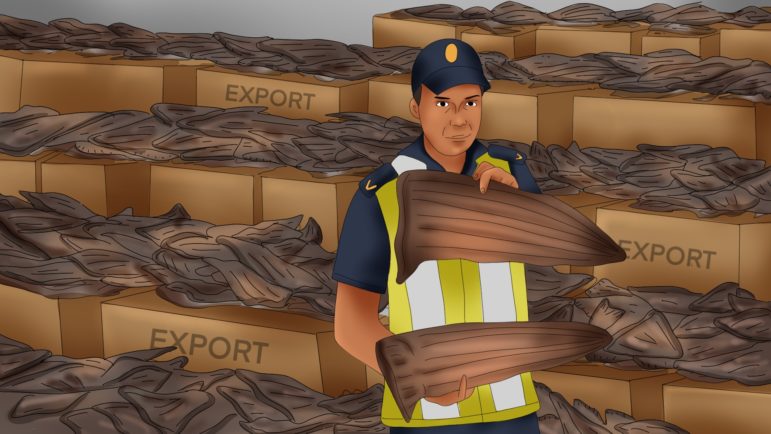
Image courtesy of Kipu Visual.
The previous years foreshadowed impacts to come in 2021 as a result of Mongabay Latam’s unparalleled reporting:
An investigation of the Ecuadorian company behind one of the largest shipments of shark fins seized in Hong Kong (26 metric tons) led the president of Ecuador’s Biodiversity and Natural Resources Commission of the National Assembly to announce that he would send a request to the prosecutor’s office to investigate the situation.
After learning about the danger posed by the construction of a highway that would link Peru (Pucallpa) and Brazil (Cruzeiro do Sul) via Latam, the Peruvian ombudsman’s office sent a report to the Congress to prevent the road from being declared ‘of national interest.’ This report was used by former Peruvian President Francisco Sagasti to oppose the legislature’s decision to approve the road.
Mongabay Latam also published a special report last year revealing 416 concessions for salmon farming in protected areas in Chile. In response, Congresswoman Cristina Girardi asked the executive director of the country’s Environmental Evaluation Service for a report on the projects entered into the environmental assessment system, as well as the number of aquaculture projects approved and located in protected areas.
In this request, she referenced Mongabay Latam’s report and also said, “It is necessary that the authorities in charge of looking after the interests of the whole nation adopt a preventive position on this type of disaster.”

The village of San José de Uchupiamonas with the mountains of the Río Tuichi valley in the background. Image courtesy of Ruth Alipaz Cuqui.
Looking ahead
After building a strong reputation as one of the top environmental journalism platforms in Latin America in just five years, Mongabay Latam is poised for more growth and even more high-impact reporting in the future.
According to Mongabay Latam’s Project Manager, María Isabel Torres, “Latin America is a privileged territory thanks to its enormous biodiversity and the presence of Indigenous cultures that have existed for thousands of years. However, this richness is, at the same time, severely threatened. Over the coming years, we commit not only to continue offering quality, independent journalism, but also to constantly challenge ourselves to ensure our stories reach diverse audiences throughout the entire region.”
Thanks to a dedicated core team and an ever-expanding network of talented journalists, Mongabay Latam will continue to be a hub for nonprofit, independent journalism. The organization will continue to focus on Indigenous peoples’ rights, oceans, and solutions-based journalism.
Support independent environmental journalism
If you are interested in helping shed light on conservation stories such as this one, there are two excellent ways you can do so with Mongabay. First, consider making a donation, which directly helps us continue to produce high-impact journalism from nature’s frontline. Second, subscribe to Mongabay’s newsletter to get the latest environmental news delivered right to your inbox.
About Mongabay
Mongabay is a nonprofit environmental science and conservation news platform focused on providing cutting-edge independent journalism from nature’s frontline. We pride ourselves in producing reporting that has substantial, tangible impacts around the world.